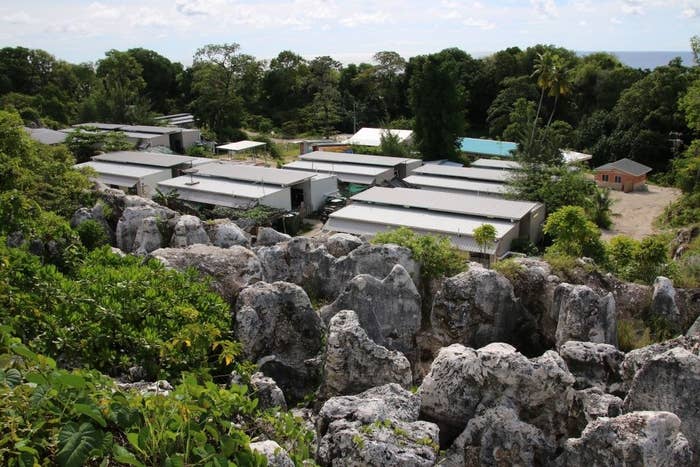
Nauru, the Pacific nation where Australia has detained hundreds of refugees and asylum seekers for half a decade, has banned overseas doctors from treating patients on the island via video or phone calls.
The ban, laid out in regulations dated Feb. 22, 2019 was put in place two weeks after international medical charity Médecins Sans Frontières (MSF) announced it would start up a telehealth service to continue to treat its patients on Nauru after being forcibly ejected by the Nauruan government in October last year.
MSF has now withdrawn that remote telehealth service, citing fear its patients could be caught in the middle of a "bizarre vendetta" between the charity and the Nauruan government.
The ban also comes amid furious debate in Australia about the health of the people detained on Nauru and on Papua New Guinea's Manus Island.
After hundreds of refugees and asylum seekers were transferred to Australia for medical treatment in recent years, politicians from opposition and minor parties passed a law dubbed the "medevac bill" to make the process easier. The new law allows two doctors to recommend a medical transfer from offshore detention, however this can be overruled by the home affairs minister, in which case a medical panel makes a final decision.
On Feb. 15 Nauru passed a law banning overseas medical transfers on the basis of telehealth consultations, and stated that a Nauru-run committee determines whether or not a patient is transferred from the island.
The new regulations on Feb. 22 ban altogether any person providing telemedicine to people on Nauru, defining telemedicine as healthcare delivered via audio, video or any other means of communication between an overseas doctor and a patient in Nauru.
Doctors who flout the ban can have their registration cancelled on Nauru. There are exceptions for staff at the Republic of Nauru Hospital (RONH), and for doctors on the island who obtain permission from Nauru's director of medical services.

Jon Edwards, the operations adviser at MSF Australia, told BuzzFeed News the ban was highly unusual, had no medical justification and was "another blow" for refugees and asylum seekers, who have high rates of mental ill health.
"We find it utterly appalling and deeply concerning because our patients are going to suffer for two reasons," he said. "One, those who have established a relationship through this program will have that ended. And more generally, access to an independent mental health service is cut off for no reason."
In the almost three weeks the telehealth service had been running, MSF had been contacted by 40 patients and held telehealth consultations with some of those people, Edwards said. All 40 were refugees and asylum seekers.
The final paragraph of the ban, which states no doctors practising on Nauru should do anything at the request of an overseas doctor who treated a patient with telemedicine, was a "critical element" for MSF in deciding to withdraw.
"They have specifically closed down our referral pathway," Edwards said, adding that medical staff at the RONH and those contracted by the Australian government to treat detainees "would be in breach of these regulations if they even talked to us".
"It’s unethical for us to continue under the circumstances that we might call for an ambulance and no-one will take our call," he said.
While there is nothing in a practical sense stopping a doctor in Australia phoning a patient on Nauru, Edwards said he feared the Nauruan government could continue to escalate if MSF ignored the ban and continued treating patients.
"We don’t want our patients to be caught in the middle of some sort of bizarre vendetta that the government of Nauru is running in relation to closing down our services," he said.
"Even if we were to somehow say it doesn’t apply to us because we’re not on Nauru and not registered on Nauru, it's clear there’s a determination to undermine the service."
In a statement on Feb. 15 Nauru's minister for health Charmaine Scotty hit out at Australian doctors and lawyers who have spoken against conditions on Nauru for refugees and asylum seekers, saying they were "grossly unprofessional" and their concerns were "unfounded".
"Nauru does not need nor does it welcome tainted medical services with an agenda under the guise of humanitarian efforts," she said.
"Nauru has operated overseas medical referral systems for over 50 years and we have done so with the core principles of patient care ... on Nauru, we medevac patients who genuinely require medical treatment not available on Nauru and we will continue to do so in the best interest of the patient."
